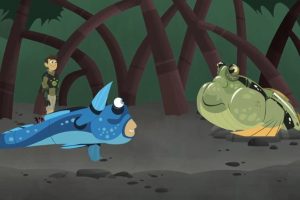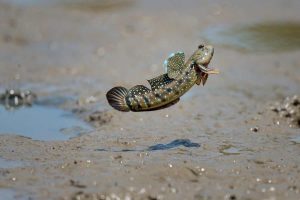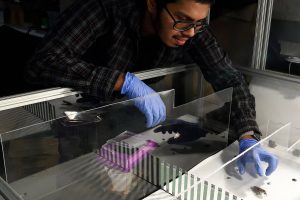Chen Li is an associate professor of mechanical engineering. He is also a core faculty member of the Laboratory for Computational Sensing and Robotics. He has a secondary appointment to the Center for Functional Anatomy & Evolution.
Li’s research integrates the disciplines of biology, robotics, and physics to establish terradynamics of locomotion in complex terrain, analogous to aerodynamics of flight in air and hydrodynamics of swimming in water, to understand animal movement and advance robot mobility. As a PhD student, Li established the first terradynamics of legged animal and robot locomotion on the flowable ground such as sand. Building on his postdoctoral training, his group at Johns Hopkins has expanded terradynamics into complex, 3D terrains with large obstacles, which are common in forest floor, mountain boulders, earthquake rubble, and Martian rocky terrain.
His recent research has uncovered how snakes climb over large steps and how cockroaches move across dense obstacles. His team applies these principles to create bio-inspired robots. They recently began researching amphibious fishes crawling in mud and spiders hunting prey on webs and in arboreal environments.
Li’s research has been published in journals including Science and the Proceedings of the National Academy of Sciences (PNAS) and was selected as an Outstanding Locomotion Paper finalist (ICRA 2022), Editor’s Choice Paper (Advanced Intelligent Systems 2021), Best Student Paper finalist (Society for Integrative & Comparative Biology 2018, 2019), Best Paper (Advanced Robotics 2017), Highlight Papers (IROS 2016, Bioinspiration & Biomimetics 2015), and Best Student Paper (Robotics: Science & Systems 2012, Society for Integrative & Comparative Biology 2009).
Li is a recipient of a Miller Research Fellowship from the University of California, Berkeley; a Burroughs Wellcome Fund Career Award at the Scientific Interface; an Army Research Office Young Investigator Award; and a Beckman Young Investigator Award. He also has been selected as an alumnus of the National Academy of Sciences’ Kavli Frontiers of Science.
A member of the American Physical Society, Society for Integrative and Comparative Biology, and Institute of Electrical and Electronics Engineers, Li has served as a reviewer for journals such as Science, Nature, PNAS, Nature Communications, Journal of Experimental Biology, Bioinspiration & Biomimetics, and International Journal of Robotics Research.
Li received his bachelor’s degree in physics and economics from Peking University in Beijing, China, in 2005, and a PhD in physics from the Georgia Institute of Technology in 2011. He then spent three and a half years at the University of California, Berkeley, as a Miller Postdoctoral Fellow training in integrative biology and robotics. He joined the Whiting School of Engineering faculty in 2016.



